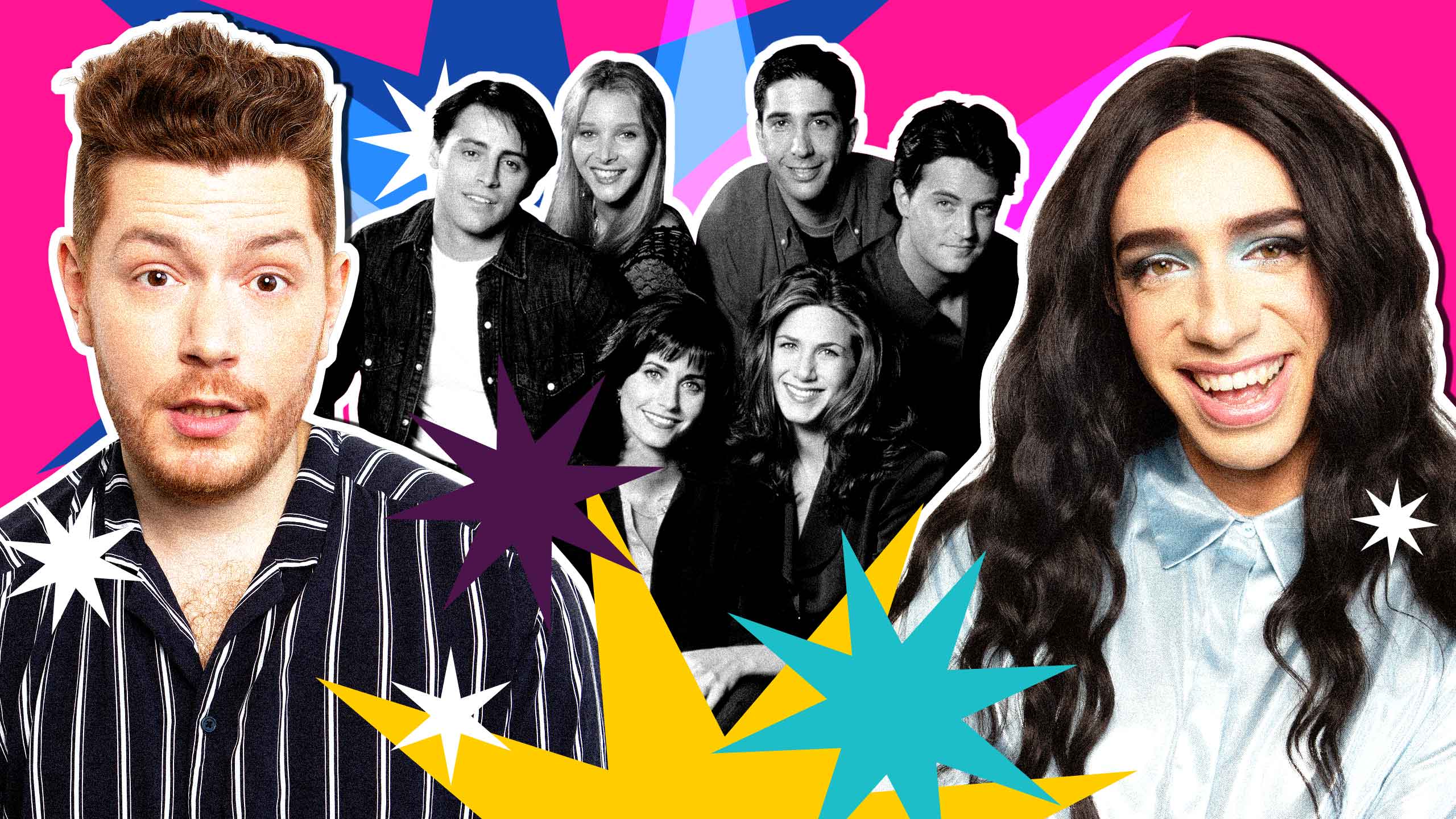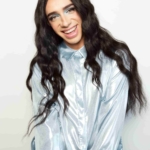Jennifer Lopez and Ben Affleck are a thing again (even if we’re still waiting for that kiss), Lindsay Lohan just booked an acting job in a rom-com and the cast of Friends has gotten together for a reunion on HBO Max, all while Sex and the City and Gossip Girl are gearing up to return later this year with new episodes. As we enter this next phase of the pandemic and slowly wake up from the nightmare of the last 14 months, are we just completely disoriented or is it 2003 again? (For the record, the Gossip Girl book series was published between 2002 and 2011. Yes, you’re that old.)
It’s been 21 years since 2000, and nostalgia for the music, film, television and fashion of the Y2K era is spreading like wildfire. For millennials, this nostalgia kick is simultaneously comforting and triggering—and it’s also a mind fuck. Films and shows set in the time of our childhood are now period pieces! It’s strange to watch pop stars like Olivia Rodrigo, who was born the year many millennials were graduating from high school, drawing aesthetic inspiration from the looks that we created. It makes us cringe! Is this how Gen X felt watching millennials discover the 1970s and ’80s?
After what’s been an extremely harrowing year, it’s no surprise that people are seeking comfort wherever they can find it. Nostalgia is like a warm lavender bath: it soothes and calms. Nostalgia is familiarity which can feel like safety and protection (just make sure it doesn’t lull you to sleep). It can also be a dangerous force in the way it erases the harm and realities of the past. Just look at the way people—even so-called leftists—suddenly started loving George W. Bush, forgetting that so much of what he did set the stage for the Trump era. While the early 2000s gave us Christina’s “Beautiful,” Kylie’s “Can’t Get You Out My Head” and Beyoncé’s “Crazy In Love,” it was also a time of stereotypical one-dimensional queer representation (hello, Will and Grace!) and an embarrassing lack of diversity on screen.
As we put on our sparkly butterfly hair clips and get out our Sony Discmans, we’re taking a deep dive into all the 2000s nostalgia making waves right now—for better and for worse.
“‘Friends’ is to comedy what Alanis Morissette’s ‘Ironic’ is to irony.”
Thomas: Let’s start with Friends (which is technically a ’90s and ’00s show). I never cared about Rachel and Ross, but I figured it would be a good thing to watch the James Corden-hosted reunion for this column. It wasn’t as totally boring as I was expecting—there were cute moments (namely anytime Lisa Kudrow appeared on screen)—but I’m still baffled that such a basic show means so much to so many people. Don’t get me wrong, I think friendship is one of the great premises for television shows, but 236 episodes? With Matthew Perry? I’ll pass.
Tranna: I’m not going to mince words: I think Friends is the worst, most unsophisticated show ever made. And I don’t care how many people attack me for that statement—this is a hill I am willing to die on! Friends is to comedy what Alanis Morissette’s “Ironic” is to irony. I used to watch Friends towards the end of its run, back when I was in high school, because that’s what everyone was watching and talking about at the time. It was a bleak moment in my life, and maybe that negative association is partly why I hate Friends so much. Even though I was a teen at the time, I never bought the characters as real adults: they were like one-dimensional 12 year olds in the bodies of 30 year olds. Obviously our tastes are totally subjective and I don’t actually judge anyone based on the film and television shows they like, but… I do secretly lose a little respect for anyone who thinks Friends is funny—sorry! You can love it for what it is, but don’t make it out to be something it’s not. Like, I love Jennifer Lopez’s music, but I’m not out here calling her a great vocalist. I understand the nostalgic attachment people have to the show—I have a nostalgic attachment to lots of dubious things that have aged terribly, like Sex and the City. But, like you, the popularity of Friends baffles me in the same way that Céline Dion’s does. If I’ve learned anything from being a performer and a pop culture junkie, it’s that you can never underestimate the widespread appeal of beige.
Thomas: There was a queer viewer on the Friends reunion special who shared how much the show meant to them, and I couldn’t help but feel sorry. I wish I could get it, but I don’t.
“The new ‘Sex and the City’ series is going to be a disaster and that’s largely because Michael Patrick King is back at the helm.”
Tranna: I feel sorry for all of us queer folks who grew up then, because shows like Friends and Will and Grace were really all we had access to and we deserved so much more.
Thomas: Now, the era of the TV reboot is also giving us new takes on The L Word and Queer as Folk, which is a good opportunity to look back at what these groundbreaking shows did and didn’t get right when they aired in the early 2000s. Even Sex and the City, with so much of its queer content falling on the shoulders of “gay best friend” Stanford Blatch (and a few episodes in season four where Samantha dated a Brazilian lesbian artist), is getting a queer makeover with the addition of a new non-binary character. Tranna, you’re a big Sex and the City fan. How do you feel about that reunion? What do you make of the news that the show will include a queer character?
Tranna: The new Sex and the City series is going to be a disaster and that’s largely because Michael Patrick King is back at the helm. He’s responsible for (what I consider to be) the downfall of the show and for the awful movies. Sex and the City 2 was particularly disastrous (although it’s one of my favourite bad movies), and I think left most people feeling like there’s nothing more to see. The new SATC series is called And Just Like That…. the worst title ever! When the teaser trailer was released, the general feeling I got from people’s reactions was: “Go away, nobody asked for this!” There doesn’t seem to be much general interest in this project and I think that has to do with Kim Cattrall choosing not to reprise her role as Samantha Jones. Yes, Carrie Bradshaw is the main character, but Samantha is everyone’s favourite; she is the comedic heartbeat and lifeforce of the show. There is truly no Sex and the City without her. Sarah Jessica Parker and Cattrall have notoriously been engaged in one of the most epic Hollywood feuds. Cattrall summed up her feelings about not wanting to be part of SATC in a 2019 interview with The Guardian: “I don’t want to be in a situation for even an hour where I’m not enjoying myself.” The headline went viral and became a pandemic mantra for many of us, myself included. And if Cattrall not returning wasn’t bad enough, Patricia Field, the iconic fashion designer and stylist responsible for the wardrobes on SATC, is not coming back either because she’s working on Netflix’s Emily in Paris! Imagine choosing Emily in Paris over an SATC reboot?
We’ve lost Cattrall and Field but, as you mentioned, we are gaining a new New Yorker. It’s been reported that Sara Ramírez “will play new character Che Diaz (they/them), a non-binary, queer stand-up comedian who hosts a podcast on which Carrie Bradshaw is regularly featured.” First of all, excuse me? Carrie is an occasional podcast co-host now? God, help us!
Thomas: See, we can all be basic!
“Will Carrie Bradshaw be the Joe Rogan for white Gen X women?”
Tranna: Between the bi erasure and transphobia of the original series, I couldn’t help but wonder: Will Carrie Bradshaw be the Joe Rogan for white Gen X women? SATC was featured in Disclosure, the must-watch Netflix documentary that tells the history of trans representation in film and television, for a deeply problematic episode where the ladies referred to trans sex workers as “the other white meat.” This is not a case of something aging badly; I think it was horrible even for the time. So adding a queer, non-binary character is an interesting move. They have to make up for so many mistakes in the original series. I also can’t help but wonder if Carrie, who couldn’t understand bisexuality, will be able to wrap her head around they/them pronouns and the concept of being non-binary.
Thomas: I’m cringing already.
Tranna: Now, with all of that being said, I cannot wait to see the new series! For all of the mess that is SATC—and against my better judgement—I will always have an affinity for these women and their chemistry. I grew up watching them and they’re a part of me, much in the same way people feel about the characters on Friends. But at least I can admit all the ways in which SATC is terrible.
Thomas: I just think that SATC is a case of a great show being ruined by corporate greed. It redefined television when it aired on HBO in 1998, but to greenlight a reboot for HBO Max just feels like a decision driven by the bottom line. If the future of television is the revival of old shows on streaming services, something isn’t right. Where is originality? To circle back to my initial worry, I don’t want to live in a culture where all we have are comic book adaptations, new Star Wars movies and shows based on historical events. What will we revive in 17 years if everything today is pulled from the past?
“Is streaming the ‘Gossip Girl’ reboot really how we want to spend our years until the coming climate apocalypse?”
Tranna: We’ll have revivals of revivals! Basically everything will be High School Musical: The Musical: The Series—which really exists! Imagine Sex and the City: The Movie: The Musical: The Series?
Thomas: Look, the last five years were traumatic. To some extent, I understand that comfort viewing has helped a lot of people navigate a society on the brink of collapse. But is streaming the Gossip Girl reboot really how we want to spend our years until the coming climate apocalypse?
I’m saying this and I don’t even fully hate nostalgia—I’m a Cancer, how could I? I’m at an age when I no longer really care about new music, except for “good 4 u,” Olivia Rodrigo’s infectious pop-punk summer song. I actually hated pop-punk back in the early 2000s, mostly for the same reasons you despise Friends: It was the most unsophisticated music genre, and to claim it had anything to do with punk was an insult to The Ramones. Fast forward to 2021 and I have become that geriatric millennial gay who actually buys what Rodrigo is selling (a savant mix of Paramore and Euphoria). Am I a zombie?
Tranna: I will listen to Olivia’s album eventually, but I just can’t bear the thought of listening to an 18 year old. I didn’t even want to listen to teen artists when I was a teen. I think it’s very strange that millennials are like, “Why didn’t we have Olivia when we were kids?” And I think that’s bullshit. We had The Miseducation of Lauryn Hill, Jagged Little Pill and Christina Aguilera’s Stripped. Be thankful!
Thomas: Olivia was also born in 2003, at the apex of Avril Lavigne’s career. I turned 18 that year and I’ll be 36 this month…
Tranna: Sorry, I’m just interrupting so readers know that while I will not disclose my age, I am younger than you!
Thomas: You can’t be young forever! I guess this whole conversation on nostalgia is also informed by my own mortality. Emerging from the pandemic (at least in Canada), I understand how precious time is. But this awareness comes with added stress: millennials are starting to turn 40, and I’m freaking out about it! Jesus, why do I care so much about age and generations?
“Our grandparents witnessed boomers, Gen X, millennials. Now with Gen Z, millennials are witnessing the rise of a new generation for the first time.”
Tranna: I don’t know, but as we get older—something I hate to acknowledge—it’s interesting to see how things change. When I was a kid, I could never have envisioned a time when major pop stars would come out as non-binary. I never even heard the word non-binary uttered when I was growing up! As a pessimist, it’s easy for me to always see what’s wrong, but things have really changed since 2003. And while there are powerful forces working hard to undo the progress we’ve made, I am in total awe of the queer representation we see today and I hope we continue to amplify it.
Before 30, you’re part of the change that every new generation makes. Because you’re in it, you can’t observe it as a witness. Our grandparents witnessed boomers, Gen X, millennials. Now with Gen Z, millennials are witnessing the rise of a new generation for the first time. We’re not the youngest people at the party anymore. The most horrifying tweet I saw recently was something along the lines of, “Us talking about the early 2000s today is the equivalent of people in the ’90s talking about the ’70s.” Enough time has passed that the years of our youth are now cultural nostalgia; Gen Z-ers are mining the early 2000s for style and aesthetics in the same way Gen X mined the ’70s in the ’90s. It’s such a weird thing to observe! I never thought anyone would ever want to dress like Britney or NSYNC again, but here we are! Bucket hats and plastic as a fabric are back!
Thomas: Nostalgia is a fact of life, and a fact of show business. But it’s a dangerous exercise, swimming through so much longing for years when things were far from perfect. I think it’s a sign of a culture afraid to look forward and be confident about its own outlook.
Tranna: I agree. Dwelling on the past so much is not healthy, both on a micro and macro level. I mean, Donald Trump’s “Make America Great Again” is founded on some fucked-up, bizarro, nightmare version of nostalgia. But when it comes to the arts, I think nostalgia is ultimately pretty harmless. During these times, it’s comforting to be reminded of the memories attached to our favourite movies, shows and albums. It’s been such an incredibly difficult 14 months that people just want to feel okay and grounded, which is partly why Jennifer Lopez getting back together with Ben Affleck (though nothing official has been confirmed) received so much attention. People want to believe it’s 2003, but it’s not like 2003 was all that great! When we were teens we had to convince ourselves that Phoebe on Friends was queer because there was such little queer representation in media. It was rough!
Thomas: People forget it was a time of war in the United States. Social media was only starting to be a force in the culture (Facebook was founded in 2004). The world was about to enter a new phase; we could feel it, but I could never have predicted the next 17 years would turn out the way they have, with politics taking both a hard right and a swing to the left. In a way, today’s culture looks at the early 2000s the way people in the ’70s remembered the ’50s: a stable and joyful time before certain groups started asking for equality. There are not that many shows that balance the nostalgia with the strange sense of pending doom that existed at the time.
Tranna: To me, the best original show that taps into the early 2000s nostalgia is PEN15. It was created by Anna Konkle and Maya Erskine, two millennial actors and writers, who also star in this largely autobiographical show about two best friends starting the seventh grade in the year 2000. Yes, 30-something Anna and Maya are playing versions of their 13-year-old selves, and they give two of the best performances I’ve ever seen. With no special effects, just through their physicality and voices, they transform into 13-year-old girls in a way that is so compelling it’s almost surreal. Everything on the show, from the writing to the soundtrack to the art design, is flawless. What I love about it is that this is not nostalgia for nostalgia’s sake; it’s a deep revisiting of a time in life that can be so deeply traumatizing. There’s something powerful and moving about watching these 30-something actors transform back into their 13-year-old selves and relive the experiences of their youth in order to process them. The show led to me re-examine that time in my life, and so much of what I experienced then still affects my life now. So nostalgia can also be healing!
Thomas: I’m also on team PEN15. I just hope the creators never make the mistake of giving us an update on the characters’ lives in their thirties.
To me, this moment is ultimately about realizing that no generation is eternal, even us millennials. And if a Friends reunion can heal the world, who am I to judge?
Montreal-based comedians Thomas Leblanc and Tranna Wintour’s podcast Chosen Family streams on CBC, Apple and Google; new episodes drop every other Thursday.



 Why you can trust Xtra
Why you can trust Xtra


